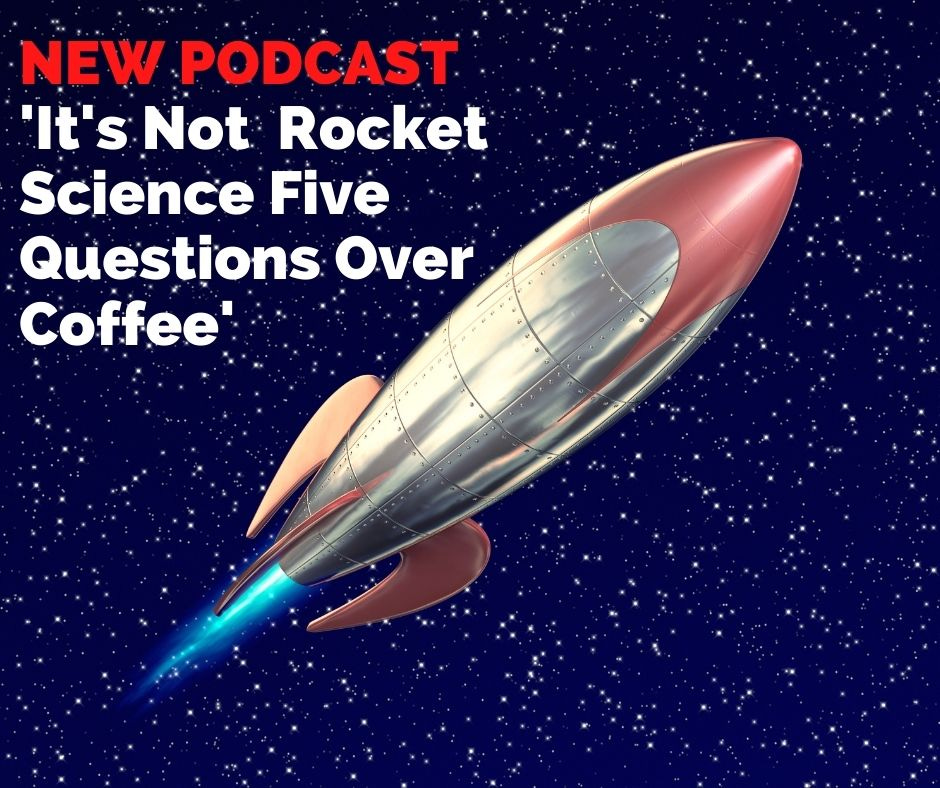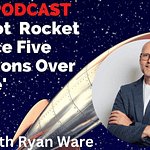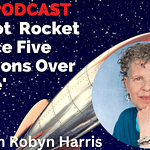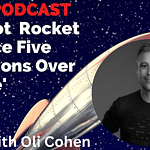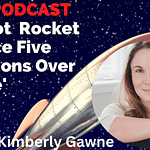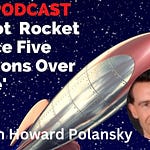Who is Joshua?
Joshua Berry is a visionary leader who is determined to fix the broken state of the workplace. With a strong belief in creating a more humane and people-positive work environment, he is committed to revolutionizing the world of work. Joshua understands that true change starts from within organizations and often seeks out leaders in strategy, innovation, growth, and human resources who share his passion for transforming the how and why of business operations. Through his book and various initiatives, Joshua aims to support these individuals in their mission to bring about positive change within their organizations.
Key Takeaways
02:10 Exploring new practices, adapting without supporting people.
04:13 Innovation hub hindered by division manager.
07:22 Daring to be naive for progress and joy.
10:26 Allow employees freedom, reap the rewards.
14:01 Impact of intangibles on bottom line ignored.
17:54 Promote and grow by building trust.
20:43 Books, openness, curiosity, inner work, progress.
23:58 Work: a space to grow people, organizations.
Valuable Free Resource or Action
daretobenaive.com
A video version of this podcast is also at
https://youtube.com/live/1ZKGoZUxiNA?feature=share
_________________________________________________________________________________________________
Subscribe to our newsletter and get details of when we are doing these interviews live at https://TCA.fyi/newsletter
Find out more about being a guest at : link.thecompleteapproach.co.uk/beaguest
Subscribe to the podcast at https://link.thecompleteapproach.co.uk/podcast
Help us get this podcast in front of as many people as possible. Leave a nice five-star review at apple podcasts : https://link.thecompleteapproach.co.uk/apple-podcasts and on YouTube : https://link.thecompleteapproach.co.uk/Itsnotrocketscienceatyt!
Here's how you can bring your business to THE next level:
If you are a business owner currently turning over £/$10K - £/$50K per month and want to grow to £/$100K - £/$500k per month download my free resource on everything you need to grow your business on a single page :
It's a detailed breakdown of how you can grow your business to 7-figures in a smart and sustainable way
————————————————————————————————————————————-
Transcript
Note, this was transcribed using a transcription software and may not reflect the exact words used in the podcast)
SUMMARY KEYWORDS
Stuart Webb, Joshua Berry, It's Not Rocket Science, Five Questions over coffee, author, Dare to be NIEV, CEO, Econic, conversation, workplace, broken, humane, people positive, leaders, strategy, innovation, growth, human resources, new practices, agile, DevOps, lean start up, HR standpoint, remote work, return to work, curiosity, trust, experimental, collaboration, leadership mindset, creativity, purpose of work.
SPEAKERS
Joshua Berry, Stuart Webb
Stuart Webb [00:00:20]:
Hi, and welcome back to It's Not Rocket Science. Five Questions over coffee. I'm delighted to be joined this afternoon by Joshua Berry. Joshua is the author of Dare to be NIEV, which is a really interesting book, and the CEO of Econic. I'm really looking forward to this conversation. Joshua, welcome to It's Not Rocket Science 5 questions over coffee.
Joshua Berry [00:00:39]:
Thank you, Stuart. Got my coffee, and we are ready
Stuart Webb [00:00:41]:
to rock. Yep. Yep. Yep. We are it's 2 o'clock in the afternoon for me. This is probably not what I should be drinking. I won't sleep, For the rest of the afternoon, which is normally what we like to propose. Anyway, Joshua, yeah, now welcome to, to to the podcast.
Stuart Webb [00:00:55]:
Good luck to have you here. Just, just for just for clarity, kind of, what is it that you're trying to do with Dare To Be Naive and and your work at Econic? Who who are the who are the customers you're trying to help them out? What problems do they have? What is, what is what is the sort of problem that you're helping them solve?
Joshua Berry [00:01:11]:
Sure. You know, I believe in a lot of ways, the workplace, is broken. Right? We can go long strides in making, the world of work Even more humane and more people positive. And a lot of the times, the people that we work with are leaders in strategy or innovation or growth Or human resources, I think some of those leaders who are most also passionate about shifting the how and why of their businesses. And, you know, that's that's routinely where we meet them. And a lot of what, as you mentioned with the book, that we're trying to do is to help more of those People as they are trying to shift those ways of being within their organizations.
Stuart Webb [00:01:53]:
And and, You know, come a lot of these these people would have tried things before they get around to reaching out to you. What what Things do you see them doing? What problems do you see them getting into before you're able to help them overcome those problems?
Joshua Berry [00:02:10]:
Good question, Stuart. I think there's there's a lot of people who are out there who know they need to do something different, And so you they rightly are looking at new practices for their organization. Maybe they are, Looking into using agile or or DevOps, or they're looking at lean start up or or new ways to do innovation in the organizations. Maybe from an HR standpoint, they're looking at remote work is a big example right now and return to work. They are experimenting with new ways of trying to shift how they do business. But I'd say one of the biggest Challenges, and sometimes the mistakes that they run into is not well, 2 of them, I guess, we can get into. The first one is That they realize that while they're trying to adapt to these new practices, they're not actually taking the opportunity to help those people adapt as they're trying to practice Those new things. Right? Like, the the whole idea of, you know, if if you dig into some of those practices, they're saying, We want our people to be more curious.
Joshua Berry [00:03:15]:
We want them to be more trusting. We want to be more experimental. We want a bit greater collaboration. And yet if you just pursue adopting one of those new says and just push it down to people and use a traditional approach to it, you're missing out on this amazing opportunity to also involve people in practicing those behaviors, Which you're actually hoping to get from some of those practices. So that's that's a big piece of it. I think the second one is, not also taking the opportunity to Do shifts in leadership mindset behavior. A great example is in the innovation space, trying to get people to be more creative or experimental or even spinning up innovation labs, But not investing equally in helping shift the mindset of leaders because they also need to work on those things that help create a safer space for people to innovate or, become more iterative in their decision making or or a number of those things. So they they try to get people to do new practices without starting to adapt and adopt new practices themselves.
Stuart Webb [00:04:13]:
I particularly love that last majority. I was involved some years ago in helping to set up, an innovation hub in the business and, You know, the people that I was working with incredibly enthusiastic, but there was a there was a division manager who would, Who would insist that everything that came through this innovation hub had to come through him for vetting before he was prepared to green light it to go forward for commercialisation And this attitude was basically, this is going to somehow destroy either part of my revenue stream or Something else that I that I hold is a pet project so I will just stop everything. So the Innovation Hub came up with, I think in the 3 months that we sort of started trialing this, a 106 Innovations of which one was given the green light, and it was one of those moments where I had to go to the chief executive and go, it's a brilliant idea, this innovation hub, but there is a problem. And he looked at me and said, do you know where the problem is? And I said, yes. I know where the problem is. He said, where is it? I said, it's in that office. He looked at me and went, I don't know how to solve that problem. And I went, and that's nothing I can do to help you.
Stuart Webb [00:05:20]:
You're absolutely right. The mindset is so critical, You know, the the number of chief executives would go, well, if we can just make it work, it will be fine, but I don't really wanna disturb anything that's going on around here because It will make other things problematic for me.
Joshua Berry [00:05:35]:
You you nailed it there, Stuart. We are in the middle of a fundamental Shift that is happening in the world of work and how work is done. And and what you're seeing is we've had things that worked for many decades that relied more on a command and control sort of approach. Right? Our ability to streamline and predict and forecast. And now we have tension, right, between, our ability to even predict the future or need things. And so Rightly so, the best leaders are saying, I need people to be more adaptable and agile and nimble, and, hence, they do all those practices that I was saying before. But it runs into this clash as you just said with people who are still trying to hold on to some of those vestiges of what got us to to where we are right now. And so we're in this interesting liminal space, and and I think you have to acknowledge that there are some of those beliefs about what maybe assessors for that person, maybe there's even internal things that that your former leader needs to work through to be able to get to a spot to make it okay for some of these new practices that that I think most employees and people want to bring into the world.
Stuart Webb [00:06:41]:
And and I guess this is the sort of the thrust of the book, dare to be naive, that that That you've you've recently got around to giving to the world and there's going to be a a link where people can go look at this and have a a look at, the book, which is here, at joshuaberry.com/ dare to b hyphen naive. I'll put that in the show notes for those people who didn't manage to catch you at this stage, but talk to us a little bit about, you know, the sort of advice and that you talk about in that book. And maybe give us some an insight of something we can go away and do, with that advice today to help move on some of these mindset shifts we need to do.
Joshua Berry [00:07:22]:
Yep. The idea of of daring to be naive is really about letting go of I already know everything. Right? And it's also about tapping into those things that represent not just what's reasonable, but also what feels intuitively Correct to look at, right? So back to the example that you used before of your leader, there's There's a lot of things that go into protecting ourselves and making us try to feel safe and smart and right and perfect and all of those things. And What we challenge in the book is a lot of times the beliefs that have led us to where we're at today, some of them have become limiting beliefs To what is possible for the future, and it's only until you have a shift into saying, you know what? I might be wrong, or you know what? There might be another way. And sometimes even things that might not have been thought before, that we're truly going to have progress. And so the book is about All those times where we probably self limit ourselves, we screen ourselves to present only those things that seem acceptable to the rest of the world, and how we might continue to move through that. Through some of the research and interviews that I've seen, a lot of people Fear being seen or labeled as naive, and yet that fear of being seen as naive actually prevents you from having a greater impact and greater joy in your life. Back to your question about maybe prompting for a free tool.
Joshua Berry [00:08:56]:
One of the things that we practice in the book, and you can find it on that dare to be naive.com or the or the link that you shared, is When we look at our practices, similar to the things that we talked about before, too often, we're not digging into what the beliefs are that power those practices. Right? And so there's a simple 2 by 2 matrix that we use to to help people, and and you can find it there, or you can email me afterwards if you can't find it. And, the tool is basically, what is the current practice? Let's take, for instance, work from home right now. It then challenges you to say, what are the beliefs, either known or maybe just observed or accepted, that are powering that practice. Right? And then it challenges people to talk about and reflect on what is shifting in those beliefs. Right? So so maybe it's maybe the practice is work from home, and the beliefs are a mixture. Oh, people can't be productive, or maybe they can be productive, or whatever it might be. You then create conversation either for the leader or for the team to be able to talk about how are those beliefs shifting or evolving, and then from those evolved beliefs, what are new that we can begin to experiment with.
Joshua Berry [00:10:10]:
And so being intentional about understanding how our beliefs inform our practices and having a simple process to To kind of dissect those and dig into those is, one of the things that we explore in the book through a myriad of different examples and ideas.
Stuart Webb [00:10:26]:
Brilliant. Joshua, I'm I'm I think you've you've you've really highlighted one of the things with you is pretty critical In the workplace today, which is the the the mindset should've shift. We talk about a lot about servant leadership and things like that, but, you know, leaders still have got to get their heads around Allowing people to to to to become themselves at work, can't they? One of my, one of the people I've Spent some time looking and and and talking to is a guy called John Timpson who runs A series of shops around the UK that are about shoe shops and he has only 2 rules for the people that work for him and that is Show up and look the part and put the money in the till. And that's it. You know, pretty much after that, his managers, the people that are on the front line, got Free reign to do a whole load of things, to really adapt their business practice and process in order to sort of truly serve the customer. As a result, He's grown enormously, and he has people working for him who worked for years and will never work anywhere else. Because they turn around and say, When it comes to spending money, he gives me free rein to do what I want. And, you know, so long as so long as they make a profit, and so long as he can sort of see they're making a profit, he gets out of their way as a As a a chairman of a large company, he just gets out of their way and leaves them to it.
Stuart Webb [00:11:47]:
That's a that's an attitude very few leaders have managed to grasp and put put put on in their organization. I think it's it's inspiring when I hear people like you sort of talk about some of this stuff and how to make that happen.
Joshua Berry [00:11:59]:
Yeah. You hit upon it there, Stuart. And one of the stories that I cover in the book, talks about a manufacturing facility, actually in France, that The CEO took it over, and it was a traditional manufacturing facility, right, where, time clock cards and you get penalized if you show up late. All of the materials and supplies are locked up in the closet, and you gotta go take your coupon to be able to get new supplies and materials. And, when Jean Francois showed up at that factory, he started to say, why did we design an organization that assumes Humans are wrong or bad or trying to be lazy or trying to get away with things. What would happen if we designed An organization from the opposite that assumes humankind was good, And they stripped away the controls. They stripped away a number of those things, and you know what? People started to show up earlier. They started to care about what they were doing.
Joshua Berry [00:13:02]:
Quality went up. Engagement went up. Their market share went up. There was amazing impact and a great return on that investment. And so we cover in the book that, like, it it isn't 1 or the other. We we we talked about it as 2 ROIs. You can get ripples of impact and a return on investment. And similar to what your leader, that you're just highlighting there, with the cashiers, It isn't, oh, I'm only going to do it as long as I'm gonna get these results.
Joshua Berry [00:13:33]:
We're not telling you to ignore those sorts of things, but it's amazing How many stories are out there of when you do choose to prioritize treating people as human, treating people as wanting to give something, and honoring people, that a lot of times a decent ROI also comes on the backside of that. And sometimes it's hard to have the faith or the optimism or the hope to be able push through some of that, that's the dare to be naive. Right?
Stuart Webb [00:14:01]:
It's a it's a great message, Shashank. I I I love the fact that I think One of the things that you're sort of highlighting there is that the return on investment is so often in things that are difficult to measure or or almost in those intangibles. You know, If you can reduce churn, if you can keep somebody working for your organization longer, you know, you reduce recruitment costs, you recruit Retention costs you recruit, you you reduce your your retraining costs. You get people who are better attuned to your customers, your ethos. Although it's something difficult things to measure it that people just therefore just don't measure and as a result they go, okay, well if we can't measure it, we'll ignore it And yet it has huge impact upon the bottom line. If you are constantly having to recruit team members and they're just they're there for a month or 2 and then go because they've been treated horribly, We don't measure that, but what we don't what we don't as a result, we miss out on is the is the impact that that has on the bottom line. People just turn around and go, I can't understand why it Costs us so much and yet, you know, going back to sort of a simple retail store, if if if those costs are built in, they raise the price And yet people will look around and go, I don't know what's don't know what happens, but down the road, that warehouse, everything's much cheaper. And everybody always seems to be the same.
Stuart Webb [00:15:17]:
I don't know what's going on. That's something that just is so often not measured even by HR departments who are trying to sort of find these things and work out what they are.
Joshua Berry [00:15:26]:
I think you're right, Stuart. There is definitely a concrete ROI that you can see from those good actions from retention and loyalty and Productivity, etcetera. I will throw out there, and this is probably maybe a little controversial for at least for me, 8 o'clock coffee. I wonder if sometimes even our thought of retention is maybe the wrong term. Right? Because it it sets up an organization and an employee as some as a person to be retained. Right? Stewart, I don't know your relationship status, and we don't need to get into this. But Imagine with my spouse if I went into thinking about what is my retention of my spouse. Right? Like that's From an unconditional love standpoint, like, that's probably not something that I'm going to go for.
Joshua Berry [00:16:13]:
And yet we I know it's not a perfect analogy here, but When we start to think about the act of care and concern for the people who are serving us in this organization, employees, And the consumers and people that we're serving, what would happen if we started from another standpoint instead of saying, I need to retain this person, and we said, what would I need to do to make this person want to be here? And I would be okay if they didn't. We work with a great leader of HR who said before, this this individual works in a community, has several Fortune 500 companies. She said, the future belongs to a place where I might have someone who works Down there at Union Pacific, down there at Mutual of Omaha, and some of their time over here with me. If I understand that that's how the community is going to be or even shortsighted, understand that I'm helping prepare people who go out into the community that I want to live in, why wouldn't I prioritize the growth and the deference, right, that we're able to do it? So, it's, it's it's it's a challenge that's out there. It's baked into a friend yesterday was telling me, you know, it's baked into the word the war on talent. Right? It it implies that there has to be this this tension or this otherness that happens to it. And and I think More and more successful leaders are testing the ideas that there can be a different relationship there.
Stuart Webb [00:17:39]:
Yeah. And I think we just had that comment come in that the retention is a word Jesus control. And you're right. It's it's a it's about it's about, that introduction of a lack of trust and falling back on our beliefs. And and I'll I'm Sorry, Greg. I'm sorry. I don't know who the user is. It's just doing that on mobile.
Stuart Webb [00:17:54]:
I'll find out as we get back out of this. But but, you know, I can remember In some of the companies that I've been working with, I have had words with managers when I say to them that one of the ways that I measure them as a success is if there are people that come through and get promoted and they go out into bigger roles because as far as I'm concerned, their job as a manager is to ensure that the people that They are working with their coach to go on and do better and and, you know, actually, the manager looks at you as if to say, but but I don't measure on people leaving and I go, Yeah. This this what I'm trying to do is turn around and say if that person leaves, they leave to a different part of the Company or they go and do something else. You've you've they they got a a a somebody who will be grateful to you forever for what you've done for them, And you will always be able to speak to them and go, do you have a young person that's ready for the next I'll take them. I'll move them on in exactly the way that you've been moved on, And they'll be throwing people your way and you'll get the best talent in your department because there will be people who trust you and it's back to trust. It is it is largely around getting them to trust that you really do have their best in at heart and their best interests and that Grows the entire operation, grows the organization as a whole.
Joshua Berry [00:19:09]:
That sounds like an amazing legacy, right, to be able to leave behind 100%.
Stuart Webb [00:19:14]:
So, Joshua, there must be some, book course or or program or or something which really started you down the path of of starting to think like Share that with us so that we can all go on the same journey that you've gone on.
Joshua Berry [00:19:30]:
And
Stuart Webb [00:19:30]:
with this, I'm gonna take a sip of coffee. This is gonna I'm gonna need you to call for You know,
Joshua Berry [00:19:35]:
if if any if any of my family is listening or friends who know me too much, they know I have a book problem. And So, there there is quite a bit, quite quite a number, so I I will try my best. More recent ones that have influenced some of this belief, One is, there's a couple authors. Diana Chapman is the main one that comes to mind of the book called 15 Commitments to Conscious Leadership, is is a great book that has helped me think through some of those shifts. I would say There's been a lot of inner work, that I've gone through because you do have to yourself. And so there's a number of programs whether it's been through the Purpose Guide Institute or, or other coaches, or or people that I've worked with who have really helped me start to understand What are the stories that are in my head that prevent me from entertaining so many other ideas that might be out there? So, For instance, you know, I needed to there's no such thing as a book problem. Thank you, Melissa. Melissa is ahead of me on reading books this Sure.
Joshua Berry [00:20:43]:
Anyway, so I can't claim I have a book problem, I guess. When I think about, specifically, though, the Ability to be able to, like, recommend books, I think there's so many. And I think just the act of people being open and curious And learning and wanting to try and dig into something different, I think that is what's helpful. And then as I mentioned, any programs that focus on inner work and what the stories are that you're telling yourself. You know, in our organization, we experimented with increased not only our financials, but even pay over the last couple of years. If I hadn't done some of my own inner work To understand what are my hesitations to share that as as as the owner and CEO of the company. Like, there's no way we're going to move beyond that. And so Yeah.
Joshua Berry [00:21:32]:
Any leaders who are starting to say, like, if this feels like a thing I wanna do, but all the rest of the world and everything is saying no, Spend a little bit of time doing some inner work just to truly understand what are the things you gain and what you lose by holding on to some of those beliefs that may actually be Time to sunset.
Stuart Webb [00:21:50]:
I think you're absolutely right, Jeff. In terms of in terms of that, one of the things that I did, with a guy that the company that we grew from, Well, initially, about 3 of us through to about 60 people. I basically took the entire company and I said, right. I'm gonna teach you how to read the company accounts. And, once a month on a Friday, I'm gonna stand up and talk about what's going on in the business, and you can ask me any questions you like. And I was astounded. First of all, that that I thought that the you know, I had a couple of people who turn around me go, What what what if they ask about so and so? And I go, well, I'm gonna be honest. I mean, you know, there's a problem.
Stuart Webb [00:22:28]:
They might as well know about it because they might know how to solve it. And that was exactly the attitude I got. There were people who were standing up and going, well, why are we doing that? Why are we spending money on that? We could do that. You go, okay. Fine. We can we can cut that or I've got an idea of how we could sell this and I'd go, terrific. Yeah. Let's get together and talk about exactly what we do do to turn that into a prop.
Stuart Webb [00:22:49]:
People who you would you'd imagine would never never be interested in doing such things, but, wow, the opportunity is is just, It's just it's just fantastic to take people on that journey.
Joshua Berry [00:23:02]:
I I I love that. You know, the the purpose of Econic, is truly to create the space for people to practice the behaviors that grow themselves and the organization. And you just nailed it right there. Like, I I believe that my community, for sure, my family, I know will be even greater if they get an opportunity to build their financial acumen, their business acumen, as you Jared. Right? And if we continually see that what we're doing you know, if if there was a question that I would hope you'd ask me, Stewart, it'd be, what is the purpose of work? And that was the question
Stuart Webb [00:23:36]:
I was about to get here, to get to you. We're gonna leave in now.
Joshua Berry [00:23:40]:
Swooping the tables. Swooping the tables on you, Stuart.
Stuart Webb [00:23:44]:
Leap in now because the last question I was gonna ask you, Joshua, is a is a question that I haven't yet asked you. What is it? And now you need to answer it. So No. I'm glad we got to that stage. We're not be needing to do anything more any more work.
Joshua Berry [00:23:58]:
Well, okay. What of the purpose of work? And I I truly believe in in today's world where where I think there's fewer and fewer institutions that bring people together for that growth. I think work can Begin and and continue to be a place for people to practice, right, those opportunities to grow themselves, right, and that work. Whether it's whether it's social experiences, whether it's collaboration, whether it's trust, whether it is creativity, curiosity, whether it's finding meaning. Right? There's there's really few places that we spend more time than work, and if we take the opportunity to say, You know what? All of our work, all of our projects, all the things that we're working on are not only a space to be able to grow the organization, but maybe first and foremost To help grow the people who are working through that, again, I think growth becomes an outcome of that and you have all the other great ripples of impact that happen that are beyond that. So, yeah, I I think that's that ties back to the mission, that that I'm definitely working on and, I'm excited to be able to share with everybody today, Stuart. So thank you.
Stuart Webb [00:25:13]:
Listen, Joshua. This has been a really fascinating discussion. I'm gonna I'm just gonna point out once again. You need to go check out Joshua's book, which is at joshuaberry.com/uh, dare to be naive. There with hyphens in between each of those words. Otherwise, it would just run into 1. Very You
Joshua Berry [00:25:32]:
you can also just go to dare to be naive .com. There is a
Stuart Webb [00:25:35]:
Or dare to be my e.com. So, please, go go check out Joshua's book. And, my thanks to you, Joshua, for coming and spending a few, minutes with us here. Listen. I'm just gonna just gonna wrap this up by saying if you would like to get a pre notification, we send we do one of these pretty much every Tuesday. If you'd like to get notification before the event so that you can join on the live and ask questions as you've seen, we've had comments and questions coming in during this discussion. Why don't you go to this link which is, httpscolon/linkthecompleteapproach.co.uk / news lecture. That gets you onto the mailing list.
Stuart Webb [00:26:13]:
You come out once every week with a little bit of a a blurb from me just telling you who's coming up And you can be on the LinkedIn live and watch out for that, each week and then obviously you can obviously also subscribe to the podcast and hear these when they get Issued as a podcast. Joshua, thank you so much, for your time. I'm just gonna leave the link back up. It's been a fascinating discussion. I love what you're doing with Econic, and the the book. Please, keep us informed. Let us know what's going on, and we look forward to watching the progress, in the future.
Joshua Berry [00:26:47]:
Thank you, Stuart. This has been fun. And if I had to leave you with one last thing, do you know the secret to taking good coffee on the go?
Stuart Webb [00:26:56]:
That's secret now.
Joshua Berry [00:26:57]:
It's it's not where you're going. It's where you've been.
Stuart Webb [00:27:03]:
Thank you, Joshua. Goodbye. Please take your jokes with you. I gotta I gotta get us out with a quick quick wrap up for you.




